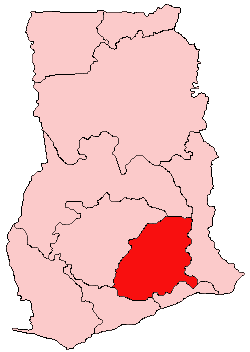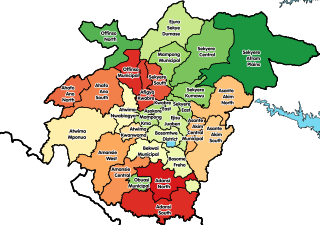Yaa Asantewaa I was the Queen Mother of Ejisu in the Ashanti Empire, now part of modern-day Ghana. She was appointed by her brother Nana Akwasi Afrane Okese, the Edwesuhene, or ruler, of Edwesu. In 1900, she led the Ashanti war also known as the War of the Golden Stool, or the Yaa Asantewaa War of Independence, against the British Empire.

Ghana is a country of 28.21 million people and many native groups, such as:

The Ashanti Region is located in the southern part of Ghana and is the third largest of 16 administrative regions, occupying a total land surface of 24,389 km2 (9,417 sq mi) and making up 10.2 percent of the total land area of Ghana. It is the most populated region in Ghana, with a population of 5,440,463 according to the 2021 census, accounting for around one-fifth of Ghana's total population. The Ashanti Region is known for its gold bar and cocoa production. The largest city and capital of Ashanti is Kumasi.

Kwahu is an area and group of people that live in Ghana and are part of the Twi-speaking Akan group. The region has been dubbed Asaase Aban, or the Natural Fortress, given its position as the highest habitable elevation in the country. Kwahu lies in the Eastern Region of Ghana, on the west shore of Lake Volta. The Kwahus share the Eastern Region with the Akyem and Akuapem, as well as the Adangbe-Krobos. Among Kwahu lands, a significant migrant population works as traders, farm-hands, fisherfolk, and caretakers in the fertile waterfront 'melting pot' of Afram plains. These migrants are mostly from the Northern and Volta Regions, as well as, some indigenous Guans from the bordering Oti and Brong-Ahafo regions live in the Afram Plains area. Kwahus are traditionally known to be wealthy traders, owning a significant number of businesses and industries in Ghana.

Asante Kotoko Sporting Club, simply known as Asante Kotoko, is a professional football club founded on 31 August 1935 and based in Kumasi in the Ashanti Region of Ghana. Nicknamed the Porcupine Warriors, they compete in the Ghana Premier League and play their home matches at the Baba Yara Stadium in Amakom, Kumasi.

Offinso Municipal District is one of the forty-three districts in Ashanti Region, Ghana. Originally created as an ordinary district assembly in 1988 when it was known as Offinso District, which it was created from the former Offinso District Council; until the northern part of the district was later split off to create Offinso North District on 29 February 2008; while the remaining part was elevated to municipal district assembly status on the same year to become Offinso Municipal District. The municipality is located in the northern part of Ashanti Region and has Offinso as its capital town.
The Mankessim Kingdom (1252–1844) was a pre-colonial African state in modern-day Ghana. It is regarded as the heartland of the Fante people, and operated as capital of the Fante Confederacy in the 19th century. The town of Mankessim still exists, and is located in the Central Region of Ghana, about an hour and a half drive west of Accra. The Mankessim Kingdom's influence was quite vast; it extended to the whole of the Fante people, and at times the entire coast of modern-day Ghana.

The Akyem are an Akan people. The term Akyem is used to describe a group of four states: Asante Akyem, Akyem Abuakwa, Akyem Kotoku and Akyem Bosome. These nations are located primarily in the eastern region in south Ghana. The term is also used to describe the general area where the Akyem ethnic group clusters. The Akyem ethnic group make up between 3-4 percent of Ghana's population depending on how one defines the group and are very prominent in all aspects of Ghanaian life. The Akyem are a matrilineal people. The history of this ethnic group is that of brave warriors who managed to create a thriving often influential and relatively independent state within modern-day Ghana. When one talks of Ghanaian history, there is often mention of The Big Six. These were six individuals who played a big role in the independence of Ghana. Of the big six, people of Akyem descent made up the majority.
Agogo is a town in the Asante Akim North Municipal District of the Ashanti Region of Ghana. Agogo is approximately 80 kilometers east of Kumasi, the capital of the Ashanti Region, and had a population of 28,271 in the 2000 census. Computer projections estimate that the 2007 population was 32,859.

The Asante Empire, today commonly called the Ashanti Empire, was an Akan state that lasted from 1701 to 1901, in what is now modern-day Ghana. It expanded from the Ashanti Region to include most of Ghana and also parts of Ivory Coast and Togo. Due to the empire's military prowess, wealth, architecture, sophisticated hierarchy and culture, the Ashanti Empire has been extensively studied and has more historic records written by European, primarily British, authors than any other indigenous culture of sub-Saharan Africa.
Konongo is a gold bar mining and manganese mining community located in Ashanti, Ghana. The town serves as the capital of the Asante Akim Central Municipal. As of 2012, Konongo has a settlement population of 41,238 people. Konongo is about 53 kilometres (33 mi) from Kumasi, the Ashanti capital.
The Akan people appear to have used a traditional system of timekeeping based on a six-day week. The Gregorian seven-day week is known as nnawɔtwe (eight-days). The combination of these two system resulted in periods of 40 days, known as adaduanan.

The Asante, also known as Ashanti, are part of the Akan ethnic group and are native to the Ashanti Region of modern-day Ghana. Asantes are the last group to emerge out of the various Akan civilisations. Twi is spoken by over nine million Asante people as a first or second language.
The Mmoaninko festival is celebrated by the chiefs and peoples of Offinso in the Ashanti Region of Ghana. The festival is celebrated every 4 years.
Adae Kese Festival is an important albeit rare celebration among the Ashantis in Ghana. There are two main periods for this celebration: one is Awukudae, and the other is Akwasidae. It glorifies the achievements of the Asante kingdom. It was first celebrated to the achievement of statehood of the people, after the war that the Ashantis had their independence, in the Battle of Feyiase which they fought against the people of Denkyira. It is also the occasion when the purification ceremony of Odwira is performed at the burial shrines of ancestral spirits. Generally, this coincides with the harvest season of yam and hence the ritual was also called the "Yam custom" by Europeans. It is celebrated every two weeks by the people in accordance with the calendar of the Akans based on the cycle of forty-two days and nine months in their calendar. The festival is mostly held to climax celebrations of specific achievements and milestones of the people of the Ashanti kingdom. The festival is a day of rest so it is forbidden to work on that day.

Asante-Akim Central is one of the constituencies represented in the Parliament of Ghana. It elects one Member of Parliament (MP) by the first past the post system of election. Asante-Akim Central is located in the Asante Akim North district of the Ashanti Region of Ghana. The member of parliament for the constituency is Kwame Anyimadu-Antwi.
Nana Dokua was the queen mother of Akyem Abuakwa. She was the one who welcomed the King of the Dwabens called Nana Kwaku Boateng and his army. A civil war broke out between the Ashantis and the Dwabens in 1832, six years after the battle of Akatamansu. In 1824, during her regime, she also provided refuge for the Kotokus who had also assisted Abuakwa in some wars against the Ashantis. During her reign, part of the Juabens revolted against the Ashantis. Nana Kwaku Boateng was the leader of the rebels who was their chief. They were forced to leave Juaben in Ashanti for the south.

The Kente Festival is an annual harvest festival celebrated by the chiefs and peoples of Bonwire in the Ejisu-Juaben district in the Ashanti region of Ghana. It is usually celebrated in the month of January. Others also claim it is celebrated in July or August.
Yaa Asantewaa Festival is an annual festival celebrated by the chiefs and peoples of the Ejisu Traditional Area in the Ashanti Region of Ghana. It is usually celebrated in the month of August.









